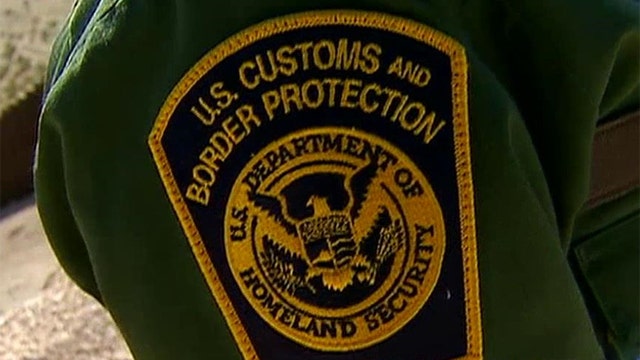The U.S. Border Patrol plans to hire 1600 new female agents by the end of September - partly due to a staggering 173 percent increase last year in the number of females caught trying to illegally cross America's southern border.
"And of course we need a lot more female agents to pat search (women), for their safety and ours as well," explained Agent Yesenia Leon, who has been with the Border Patrol for five years. "It's not necessary for a female to pat search another female, but it is preferred."
These days, many of the women crossing illegally into the United States come not from Mexico, but from countries further south. The longer journey makes conditions all the more dangerous, particularly for women and children.
According to an Amnesty International report, as many as 60 percent of females are sexually assaulted before making it to the U.S.
That is another reason for putting more women on the job according to Agent Marcella Benson, who has been with the Border Patrol for seven years.
"If we have more females, we kind of are able to relate to a female a little easier than it would be for a male to relate," she said.
Another reason for hiring more females is that only five percent of the Border Patrol's current 21,000 agents are women.
"The military is about 15 percent active duty women," explains Assistant Chief Patrol Agent Jennie Marquez. "And large law enforcement agencies...are about 15 percent women and so we're working very hard to round out our workforce."
U.S. Customs and Border Protection received a federal exemption to ask for female applicants last December. So far, 5,700 women have answered the call.
The hiring process includes a written exam, oral interview, and a physical as well as a polygraph test and an extensive background check.
It will be several months before any of the new applicants enter training. Those who make it that far should be prepared for a rigorous program.
"I can tell you that most classes that start with a full class do not graduate with a full class," according to Marquez, who helps run the Border Patrol's training center in Artesia, New Mexico. She says the training program is designed to be difficult for a reason.
"Because our job in the field is very diverse, very dynamic (with) different terrain, environments and different situations that we'll encounter on a daily basis."
Female cadets are treated no differently than men, something confirmed by Marylynn Aaron, who is in the current class of recruits at the academy.
"We're all held to the same standards. We're going to get an extensive amount of training in firearms and driving, in physical conditioning, in learning the laws."
Haley Miller recently completed her 13 weeks of academy training. She is now doing eight weeks of Spanish immersion before heading to her station in Ajo, Arizona for the required three months of field training.
"I chose to go into the Border Patrol because I felt it would give me more opportunity. And the Border Patrol Search, Trauma and Rescue team really appealed to me." Currently there are only a handful of women on the BORSTAR team.
"It's a fun thing to be physically able to be matched to a male and be able to surpass some of them," says current Border Patrol Agent Marcela Benson, who went through training seven years ago.
"And to be able to be the best. Just because you're female doesn't mean you can't do some of those things."
Benson says the tough training is definitely worth the reward. "I work outdoors and I'm able to work with all sorts of people. Yeah, I love my job."
Leon encourages women to apply. "We have a lot of activities and details they could do, whether it's prosecutions, working in the intel department, working with ATVs, horse patrol, bike patrol."
But she cautions that while the job is enjoyable, it can also be intense. "You gotta be ready for anything because things change from one second to the other," she added.










































